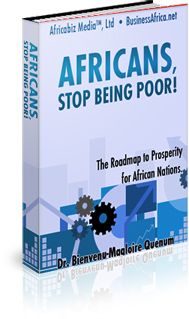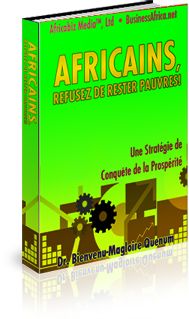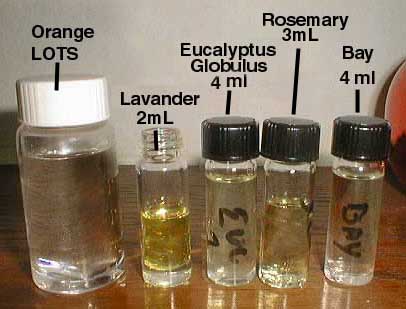|
****JavaScript based drop down DHTML menu generated by NavStudio. (OpenCube Inc. - http://www.opencube.com)****



|
| ! |
| AFRICABIZ
VOL 1 - ISSUE: 50
JUNE
15 - JULY 14, 2003
Previous
Issue
Editor: Dr. Bienvenu-Magloire
Quenum
Click here for contact & support console
| | A
WORD FROM THE EDITOR
| | |
|
Dear visitor and international investor,
We
warmly welcome you, if this is
your first visit to Africabiz
Online - The ultimate newsletter
on trading and investing in 49
sub-Saharan African countries.
If you are a regular and faithful
reader, welcome back.
The section about Business Opportunities In Africa deals with a small scale operation
to producing marketable pure essential oil right from your kitchen table.
Click here for more.
-
NOW WHAT? G-8 SUMMITS WILL NEVER DELIVER
One year ago, on June 28, 2002, we added an addendum to Africabiz Online
Email Edition's Issue 34, stating:
"Here we are. On this
June 28, 2002 G-8's heads of states finished their two-day meeting in the remote
hideout of Kananaskis, Canada, without dealing properly with the financing package
needed to launching NEPAD' implementation.
The outcome is not a surprise
- as far as Nepad is concerned. G-8's leaders promised to better tackle the matter
next year. And next year, they will promise for the next one! And year after year
Africa will continue to drift into sheer poverty.
It is obvious that
the wealthy states will not hand out points of economic growth to any emerging
country. Have you ever seen a prosperous merchant freely giving market share
to competitors?
Africa will have to fight to win its share of the
world's market. We Africans will never gain anything from G-8 free! We will
be panting year upon year after the carrot for no benefit.
| ASIA
COUNTRIES ON THE ROAD TO MONETARY UNION
11 central banks and
monetary authorities in the East Asia and Pacific region, through The EMEAP
(Executives' Meeting of East Asia and Pacific Central Banks) strengthen
their monetary and financial cooperation . They setup on June 2, 2003 Asian
Bond Fund (ABF). An important step in regional cooperation aiming at promoting
bond markets in the region. Click
here for more. | |
Let us become realist and devise alternative strategies to control the economic
development of our countries."
Just like the Asian tigers
did. They didn't bank, from the start, on any kind of NEPAD. It is only now
in year 2003, that, after four to five decades of sustainable double-digit rated
economic growth, they are contemplating a strong economic union."
Above paragraphs quote what we wrote one year ago, on June 28, 2002, after the
non-positive result achieved (for Nepad financing) by the G-8 meeting at Kananaskis,
Canada.
The non-productive outcome of 2003's G-8 summit (Evian / France
June 1-2), unfortunately, proves us right. The summit did not deliver the financing
package for NEPAD's implementation as expected by the African sponsors of the
scheme. [Click
here for a disappointed assessment of the summit by Patrick Nicholson, spokesperson
for British aid agency - Cafod. In case the link is no more available, you may
Search BBC Online with the following search string: Patrick Nicholson, G-8, Evian,
France, June 2003, date of publication: June 3, 2003]
Considering
the current tense international political situation (Iraq, North-Korea, Iran,
Afghanistan, Middle East - to name the few) one can easily predict that the forthcoming
2004's G-8 summit (scheduled to be held in the United States of America) will
not produce any tangible result for Africa. Neither will do the subsequent summits
for at least 5 to 10 years!
IT IS HIGH TIME
TO PLAN FOR ALTERNATIVE STRATEGIES
It is now obvious that
the wealthy countries' leaders will not hand over to Africa their hard-won economic
growth points. That is normal. They are elected to their leadership positions
to securing the prosperity of their countries' folks. A joint statement of African
Unions and non governmental organizations, at the end of G-8's Evian summit, stated:
"The political will of the eight most powerful countries to meet their
obligations to Africa has simply dried -up" - and implicitly recognized
the deadlock.
Let us face the truth. G-8 summits will not deliver
the "huge" financing package requested by NEPAD' sponsors.
Therefore, we Africans have to urgently organize our respective national economy
in order to raise our global share of the international market - upwards from
the ridicule 2% we now have to build up the prosperity of our countries as the
Asian tigers did. It is urgent to think about alternative strategies because as
here exposed, NEPAD, as conceived,
is not the answer to the developing gap.
[Click
here to read in AllAfrica.com What Nepad Is Really About?. In case
the link stop working you may find the article making research in Business
Day with the following Search string: December 6, 2002, Jonathan Katzenellenbogen,
Nepad.]
WHICH STRATEGY THEN? PROJECT ORIENTED
SCHEMES
As here discussed, double-digit
economic growth rate is an absolute necessity for the sustainable economic development
of any emerging country. Could Nepad's initiatives trigger double-digit annual
economic growth-rate in each African country? In a short span of time to counterbalancing
the growth-rate of the populations and inflation rate?To resorb the high level
of unemployment - 20% to 60 % of the available workforce - existing in the majority
of African countries?
We strongly doubt Nepad could trigger the sustainable
economic development of any African country. Our conviction is reinforced by the
"negative" outcome of successive G-8 summits. We have to face the reality.
G-8's countries will not, for many political and economic reasons, provide, in
one go, the "huge" financing package [US$ 64 billion] needed to implementing
NEPAD. Furthermore, existing regional organizations throughout Africa failed,
till now, to trigger the sustainable economic development of their members states;
after more than two to three decades of activities, which shows that regional
groupings are not either the answer to the developing gap.
Even if things improve and G-8 eventually delivers, in the near future, some kind
of financing backing to implementing Nepad, it is unrealistic to expect NEPAD,
as now conceived, generating, in the short term, double-digit annual economic
growth-rate. Because, first, Nepad implementation will be taking at least a
decade to be fully operational; and, second, Nepad's listed
initiatives are global and not projects oriented from the start. These different
initiatives will take two to three decades to producing tangible economic results.
In the meantime, the increase (3% in average per year) of the populations
will continue to eat out the meager economic growth rate achieved by African countries
(5 to 8% maximum) not to mention the inflation rate. Consequently, the majority
of African countries will soon be engulfed in aggravated poverty leading to political
destabilization, civil unrest and civil wars.
Therefore, in addition
to the efforts made to promoting Nepad, Africa's leaders will quickly improve
the economic development of their respective country if they devise and promote
projects oriented development schemes. Projects that link together agriculture
development, industrial transformation of crops and expansion of related services.
These projects oriented integrated schemes are doubtless more attractive to direct
foreign investors and to the international commercial banking system. Click
here for a case study.
Such integrated development schemes - having
the inherent capacity (Synergetic
Impact Factor) of boosting up the economic development and creating riches,
are capable, in a very short span of time of 10 years, to tremendously multiplying
the per capita Gross National Product of any African country.
Click
here for a case study on how to boost the per capita GNP from US$ 380 to US$
2,500 in ten years for an African country.
FINANCING
IS THE MAIN ROADBLOCK
In a previous delivery,
we stated : "There Are Already Aplenty of Initiatives To Boosting African
Economy. Score of International Supporting Organizations, several African
Regional Organizations, Multilateral Economic Treaties...But financing is the
roadblock. If a solution is found to financing projects in Africa, a huge
step forward will be made to integrate Africa into the mainstream of international
trade".
All existing initiatives to boosting the African economy
are good ones. Treaties
with the European Union and AGOA
are useful. However, they need, to yield success, to be backed, first, by a flexible
and pragmatic financing supporting scheme; and, second, by national implementation
bodies. Otherwise, the implementation of projects in African countries will
not yield tangible and sustainable economic results. And subsequently, year upon
year, Africa' share of the international trade will remain at the ridicule level
of 1-2%.
NEPAD' sponsors are searching for US$ 64 billion to implementing
NEPAD. We know now for sure that G-8's summits will not deliver such an amount
in one go. African leaders may succeed convincing their G-8's counterparts if
they lobby for one third of said amount, for instance, to be setup to establishing
an International Bank Guarantee Structure - IBGS - for Africa.
With such Capital amount in the range of US$ 21 billion, the International Bank
Guarantee Structure For Africa could easily raise twenty times more money i.e.
US$ 400 billion (during the first two operational years) on the international
financial market.
Click here to read more about
the proposals about the International Bank Guarantee Structure and National Implementation
Business Centers. And here
on how to boost-up the GDP of an emerging country from US$ 300 to 2,500 in ten
years. The justification for the amount of US$ 400 billion is here
to review.
| Your
feedback / objection / contribution is welcome. Visit WorldWide
BizCenter,
and choose General
Information (as topic) to
create a thread for discussion. On the top of the WorldWide BizCenter page,
there is a HELP link to assist you making an efficient
use of the discussion board. This
link also is useful |
THE PROBLEM OF COLLATERAL
ENHANCEMENT TO SECURING A LOAN
In continuation to our delivery
dedicated to How Financing Research Brokerage Works, here
is exposed Dr. Quenum & Associates / The Dynamic Group, LTD advises on how
to tackle The problem of Collateral Enhancement To Securing A loan
-
Contributor's Guidelines are here
for review. Your contribution on "How African countries / entrepreneurs
could bridge the developing gap" is welcome.
Many thanks for dropping by and see you here on July 15,
2003
Dr. B.M. Quenum
Editor
of AFRICABIZ

| | | |
BUSINESS
OPPORTUNITIES IN AFRICA
| |
-
Several business opportunities - component parts of the Integrated Developing Scheme described in Africans, Stop Being Poor! are listed in following table.
a-
SHEA BUTTER (Issues 5, 6,
7, 11,
12, 13)
b- BLUE GOLD (Issues 14,
15, 16,
17, 18,
19)
c- FREEZE-DRIED
PAPAIN (Issues 20, 21,
22 and here)
d- KENAF (Issues 23,
24)
e- VEGETABLE OIL
(Issues 25, 26,
27 and 28)
f- CEREALS (Issues 30,
31, 32,
33)
g- FRUITS
(34, 35,
36, 37,
38, 39,
40, 42,
43, 44,
45, 46)
h- ESSENTIAL OILS (47,
48, 49)
|
-
TROPICAL FLOWERS AND FRAGRANCE PLANTS AGRIBUSINESS AS INCOME
BUILDING POWER FOR AN AFRICAN COMMUNITY: PART
- IV - PRODUCE ESSENTIAL OILS AS A HOME BUSINESS / SMALL SCALE PRODUCTION OF ESSENTIAL
OILS
Essential
oils are odorous products from natural raw materials such as leaves, fruits, roots
and wood of many seasonal or perennial plants. They are of complex composition
and contain alcohol, aldehydes, ketones, phenols, esters, ethers, and turpenes
in varying proportions. An estimated 3,000 essential oils exist of which around
300 are of commercial importance. Most of them obtained from agricultural plants,
but some 28 essential oils collected in commercial quantities from wild sources
Here is a shortlist of essential
oils and the plants they originated from; with the main producing countries.
To give an idea of the complex mixture of chemical ingredients present
in essential oils, the chemical composition of Geranium essential oil is exposed
here
-
PRODUCTION YIELDS OF SOME RAW MATERIALS SUITABLE TO PRODUCING ESSENTIAL OILS
In Table
below, extracted from an original based on data from the the US' Department of
Agriculture, are listed some plants, seeds and fowers suitable to producing esential
oils; and the percentage of the raw material, which yields the final product.
|
Raw Materiasl
| Species
| Parts
Used | %
Yield | |
Allspice
| Pimenta
dioica | ground
seeds | 4.5
| | Angelica
| Angelica
archangelica | root
| 0.3
- 1.0 | |
Anise |
Pimpinella anisum
| seed
| 1.5
- 4.0 | |
Calamus root
| Acorus
calamus | roots
| 1.5
| | Camphor
tree | Cinnamomum
camphora | leaves
& twigs | 2
| |
Cardamom
| Elettaria
cardamomum | seeds
| 8
| |
Carrot |
Daucus carrota
| seed
| 0.1
- 7.1 | |
Cassia bark
| Cinnamomum
aromaticum | quills
| 1.5
| | Cassie
| Acacia
farnesiana | flowers
| 1.9
| | Cedar
wood | Juniperus
virginiana | wood
chips | 4.5
| |
Clove |
Syzygium aromaticum
| flower
buds | 14
- 21 | |
Coffee |
Coffea species
| roasted
"beans" | 0.12
| |
Corriander
| Coriandrum
officinalis | seed
| 1
| |
Garlic |
Allium sativum
| root
bulbs | 0.1
| |
Geranium
| Pelargonium
species | leaves
| 0.3
- 2.0 | |
Ginger |
Zingiber officinale
| rhizome
| 3
| |
Lavender
| Lavendula
angustifolia | flower
tops | 0.5
- 1.0 | |
Lemon peel
| Citrus
limon | fruit
rind | 2
| |
Lemongrass
| Cymbopogon
flexuosus | leaves
| 1
| | Marjoram,
sweet | Origanum
majorana | leaves
| 0.9
| | Mignonette
| Reseda
odorata | flowers
| 0.002
| | Mustard,
black | Brassica
nigra | seeds
| 1.5
| | Nutmeg
| Myristica
fragrans | seed
| 15
- 25 | |
Orange peel
| Citrus
species | fruit
rind | 1.5
- 2.0 | |
Orange flowers
| "
| blossoms
| 0.1
| |
Oranges, unripe
| "
| young
fruits | 3.0
- 5.0 | |
Oregano-wild marjoram
| Origanum
vulgare | leaves
& stems | 1.2
| | Parsley
| Petroselenium
crispum | seeds
| 6
| | Parsley
| "
| leaves
| 0.5
| | Patchouli
| Pogostemon
cablin | leaves
| 2.0
- 4.0 | |
Pepper, black
| Piper
nigrum | seeds
| 2.5
| |
Pepper, white
| "
| powdered
seeds | 1.5
| |
Peppermint
| Mentha
x piperita | leaves
& tops | 1.0
-2.5 | < |
Rose |
Rosa species
| flowers
| 0.006
| | Rosemary
| Rosmarinus
officinalis | leaves
| 2
| | Sandalwood,
white | Santalum
album | root
wood | 4.5
| | Sassafras
| Sassafras
albidum | root
bark | 4
| | Tangerine
peel | Citrus
nobilis | fruit
rind | 0.5
| | Thyme
| Thymus
vulgaris | leaves
& stems | 2.5
| | Tumeric
| Curcuma
longa | root
powder | 5
| | Vervain
| Verbena
officinalis | leaves
& tops | 0.2
| | Vetiver
| Vetiveria
zizanioides | root
| 0.9
| |
Ylang ylang
| Cananga
odorata genuina |
flowers |
2
|
The Yield's percentages above listed (last column at the right side of the table)
will help you estimate the purchasing cost of the raw material you used to producing
essential oils right from your kitchen table as below exposed.
- SMALL SCALE PRODUCTION RIGHT FROM YOUR KITCHEN TABLE
There is
in the trade equipement size-up for just 2 liters for the boiling sink
(primary boiler); and 2, 5 or 10 liters for the secondary boiler, which
contains the raw material. [Click
here for more on production methods]. Pricing is in the range of US $ 300
to 1,000. Click
here for more. Samples of essentials oils obtained with the small scale equipement
show on the image below.
Click here for instructions on how to proceed. For useful instructions
on how to prepare the raw material (harvesting, drying and storage) Right
Click here and choose "Save Target As" to download an interesting
Adobe PDF document. You may need Adobe
Reader. 
Here
is a Newsletter on market trends about raw material pricing. Need courses about
Essential Oils before starting the production as a home business? Click
here.
And look
here to compare selling prices of several essential oils (Input Essential
oil in the Search Field of the website or look into Health & Beauty directory)
and evaluate your benefits after deducting operational costs. Here
is another prices' list.
Adobe
Acrobat Reader is available here
Issue 51 exposes a medium
/ large scale operation to producing essential oils on industrial basis.
- Interested parties - private African and international investors /
companies, government
agencies,
international development
agencies - to make contact through the Free Access Support Console available at this link
Contact through the support console will get quickest reply from Africabiz Online's staff, than contact by emails. Click here for contact information. Be advised that first contact should be through the support console to be followed by phone calls. If you are a VIP-Member, use VIP-Members Support Console available here.
Before you consult please click
here to review this clarification
| |

